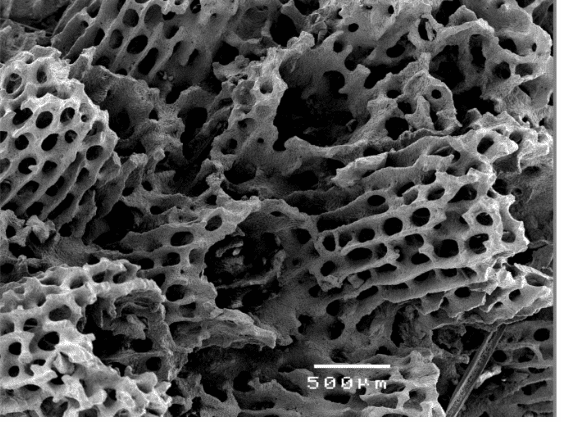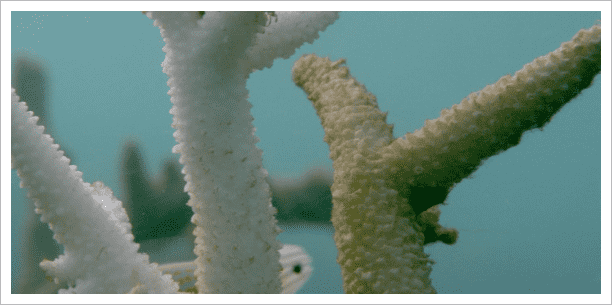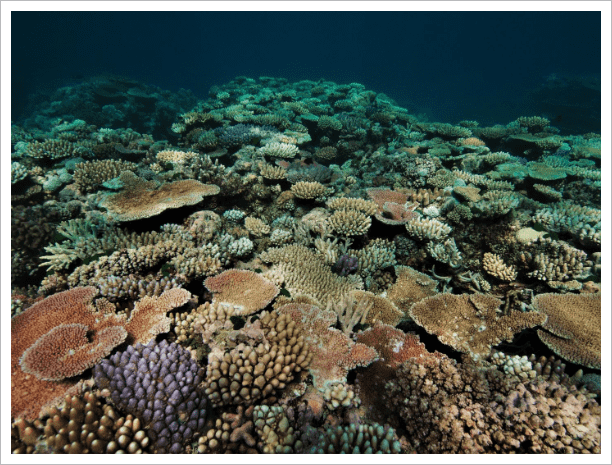Climate change: Extreme ocean heatwaves are destroying coral at an alarming rate, shocking new data reveals

Coral reefs are now being subjected to extreme marine heatwave conditions due to climate change and this can have a far more severe impact as compared to coral bleaching than previously thought, warn scientists. A research team has discovered that such intense heatwaves are causing rapid coral death and decay, and not just bleaching.
Researchers show for the first time what really happens to corals during these extreme heatwaves, and they reveal that it is not just coral animals that are affected, their skeletons start to decay too. The coral skeleton dissolves rapidly following the intense heatwave - and this phenomenon has not been known to date. This means that the three-dimensional coral framework, which provides a home to many other animals on the reef, is also at risk, says the team.
According to the research team, comprising members from the UNSW Sydney, The University of Newcastle, University of Technology Sydney, James Cook University, Australia, and the National Oceanographic and Atmospheric Administration (NOAA), US, the findings reveal that marine heatwaves are a much bigger threat to coral reefs as the coral animal dies and its underlying skeleton is all that remains. “Heatwave conditions result in an immediate heat-induced mortality (death) of the coral colony, rapid coral skeletal dissolution, and the loss of the three-dimensional reef structure,” says the study published in Current Biology. It adds, “Marine heatwave events on coral reefs are entirely different from the way coral bleaching has been understood.”
Dr Scott Heron from James Cook University says climate scientists talk about ‘unknown unknowns’ - impacts that have not been anticipated from existing knowledge and experience - and the latest discovery fits into this category. “The rapid dissolving of coral skeletons following severe heatwaves has not been known to date. As we begin now to understand this impact, the question is how many more of these ‘unknown unknowns’ might there still be that could bring faster and greater damage to coral reefs from climate change,” he says.

‘Bleaching’ is a sign that the corals are in distress. An iconic reef such as the Great Barrier Reef (GBR) in Australia has been one of the worst victims of bleaching, which killed 50% of its corals. While corals and algae depend on each other for survival, when ocean temperatures rise, corals expel the algae living in their tissues and turn white, a phenomenon known as bleaching. Bleached corals are at increased risk of disease and death.

The latest research, however, shows that more severe marine heatwaves, as the one which occurred on the Great Barrier Reef in 2016, are even worse for corals. “The water temperatures are so warm that the coral doesn’t bleach, it dies. We still see the coral become white as the animal dies and its skeleton is exposed to the water, and then we see it very rapidly become overgrown by colonizing algae from both the inside out and the outside in. This process of rapid colonization and decay is devastating not just for the animal tissue, but also for the skeleton that is left behind, which is the three-dimensional framework of the reef", says Tracy Ainsworth from the University of New South Wales, Sydney, Australia.
Until now, coral bleaching has been described as an event where the “symbiotic relationship” between coral and its microbes breaks down, and corals lose their primary source of nutrition, and the coral can die if the symbiosis is not restored. But the results show that the coral animal does not bleach - in terms of a loss of its symbiosis - the animal dies.
“This work provides clear evidence that the intense heatwave conditions, which are now becoming a feature of bleaching events, are far more severe and are changing how we understand the impact of climate change on coral reefs and the consequences of severe heatwave events,” says William Leggat, first author of the study from the University of Newcastle, Australia.
The team had earlier shown that just a 0.5C increase in water temperature changes the extent of mortality in corals during bleaching. In the new study, they examined GBR corals following the 2016 mass bleaching event. At that time, reefs of the northern GBR were exposed to a rapid and severe rise in sea surface temperatures, with more than 30% experiencing temperatures above the established threshold for coral survival. The researchers simulated the harsh heatwave conditions seen on the GBR in 2016 with two coral species that showed high mortality that year.
“The heatwave conditions lead to immediate heat-induced death of the coral colony, as the coral skeleton rapidly dissolves and its structure is lost. Within days, a complex microbial biofilm encases the exposed coral skeleton, further accelerating the loss of calcium carbonate from the reef to weaken it even further. The results reveal a previously unrecognized impact of climate change on coral reefs,” the results show.
These results demonstrate that severe-heatwave-induced mortality events should be considered as a “distinct biological phenomenon” from bleaching events on coral reefs. The team adds that such events, and the subsequent rapid reef decay, are likely to become more frequent as the intensity of marine heatwaves increases in the coming years.

Accordingly, the researchers have called for an urgent need to mitigate climate change and initiate actions to reduce marine heatwaves, to prevent the degradation of coral reefs and the subsequent collapse of ecosystem services that sustain over half a billion people globally.
“A failure to mitigate climate change and minimize the emergence of frequent and severe marine heatwaves not only puts corals and coral reefs at risk of ecosystem collapse but also threatens the livelihoods of the half a billion people worldwide directly reliant on the goods and services they supply", says the study.